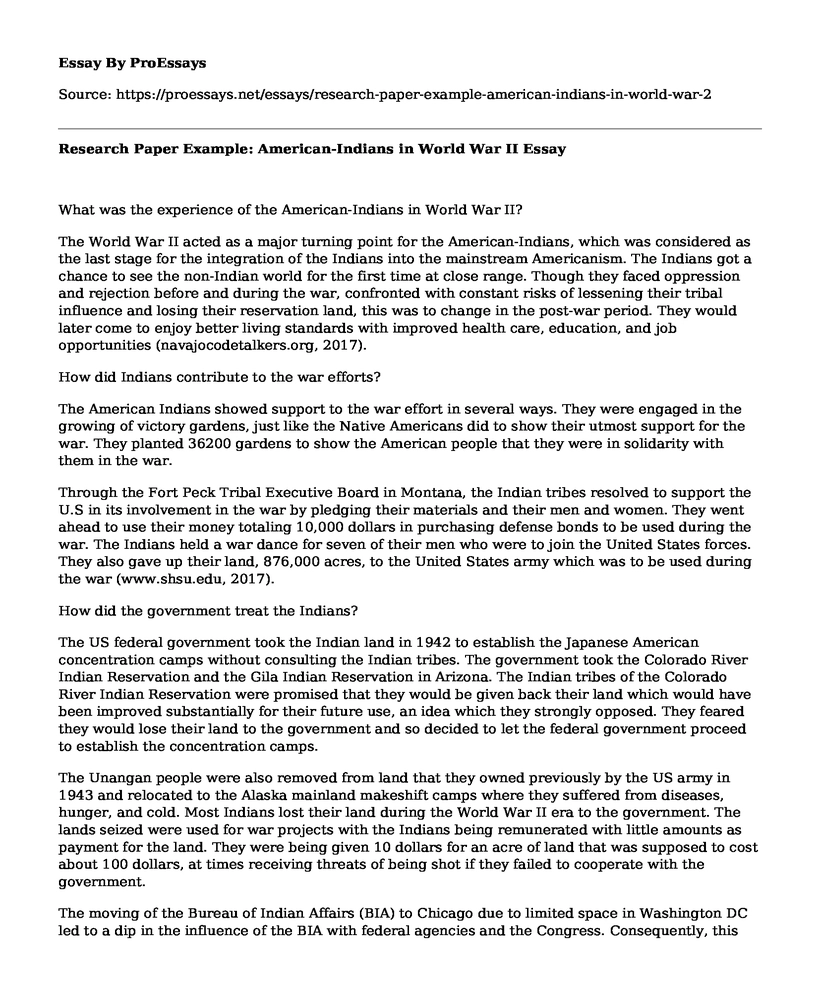What was the experience of the American-Indians in World War II?
The World War II acted as a major turning point for the American-Indians, which was considered as the last stage for the integration of the Indians into the mainstream Americanism. The Indians got a chance to see the non-Indian world for the first time at close range. Though they faced oppression and rejection before and during the war, confronted with constant risks of lessening their tribal influence and losing their reservation land, this was to change in the post-war period. They would later come to enjoy better living standards with improved health care, education, and job opportunities (navajocodetalkers.org, 2017).
How did Indians contribute to the war efforts?
The American Indians showed support to the war effort in several ways. They were engaged in the growing of victory gardens, just like the Native Americans did to show their utmost support for the war. They planted 36200 gardens to show the American people that they were in solidarity with them in the war.
Through the Fort Peck Tribal Executive Board in Montana, the Indian tribes resolved to support the U.S in its involvement in the war by pledging their materials and their men and women. They went ahead to use their money totaling 10,000 dollars in purchasing defense bonds to be used during the war. The Indians held a war dance for seven of their men who were to join the United States forces. They also gave up their land, 876,000 acres, to the United States army which was to be used during the war (www.shsu.edu, 2017).
How did the government treat the Indians?
The US federal government took the Indian land in 1942 to establish the Japanese American concentration camps without consulting the Indian tribes. The government took the Colorado River Indian Reservation and the Gila Indian Reservation in Arizona. The Indian tribes of the Colorado River Indian Reservation were promised that they would be given back their land which would have been improved substantially for their future use, an idea which they strongly opposed. They feared they would lose their land to the government and so decided to let the federal government proceed to establish the concentration camps.
The Unangan people were also removed from land that they owned previously by the US army in 1943 and relocated to the Alaska mainland makeshift camps where they suffered from diseases, hunger, and cold. Most Indians lost their land during the World War II era to the government. The lands seized were used for war projects with the Indians being remunerated with little amounts as payment for the land. They were being given 10 dollars for an acre of land that was supposed to cost about 100 dollars, at times receiving threats of being shot if they failed to cooperate with the government.
The moving of the Bureau of Indian Affairs (BIA) to Chicago due to limited space in Washington DC led to a dip in the influence of the BIA with federal agencies and the Congress. Consequently, this resulted in the slashing of the BIA budget and the New Deal Indian programs were done abolished. As if that was not enough, Indians who left the reservation in search of employment opportunities in defense-related industries found that they were being paid less for the same amount of work done compared to non-Indians (nativeamericannetroots.net, 2017).
References
http://www.shsu.edu/~his_ncp/NAWWII.htmlhttp://navajocodetalkers.org/http://nativeamericannetroots.net/diary/609
Cite this page
Research Paper Example: American-Indians in World War II. (2021, Apr 07). Retrieved from https://proessays.net/essays/research-paper-example-american-indians-in-world-war-2
If you are the original author of this essay and no longer wish to have it published on the ProEssays website, please click below to request its removal:
- The Life of W.E.B. Du Bois
- To What Extent Did Abraham Lincoln Grow the Executive Powers of the President? Essay
- Biography of Charlotte Perkins
- History: The American Civil War 1861 - 1865 Documentary
- Essay on Egyptian Life after Death
- Essay on Dr. Herb Grandbois: Pioneering Native American Studies at Creighton University
- Reconstruction Era: 1865-1877, End of Slavery & Freedmen's Bureau - Essay Sample







